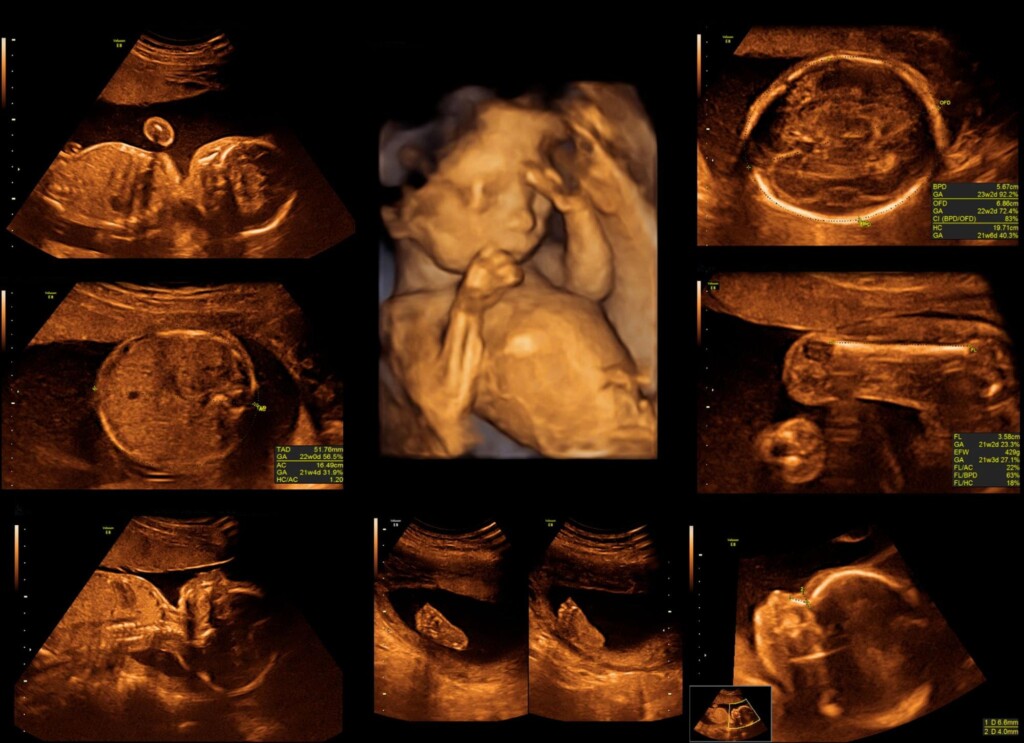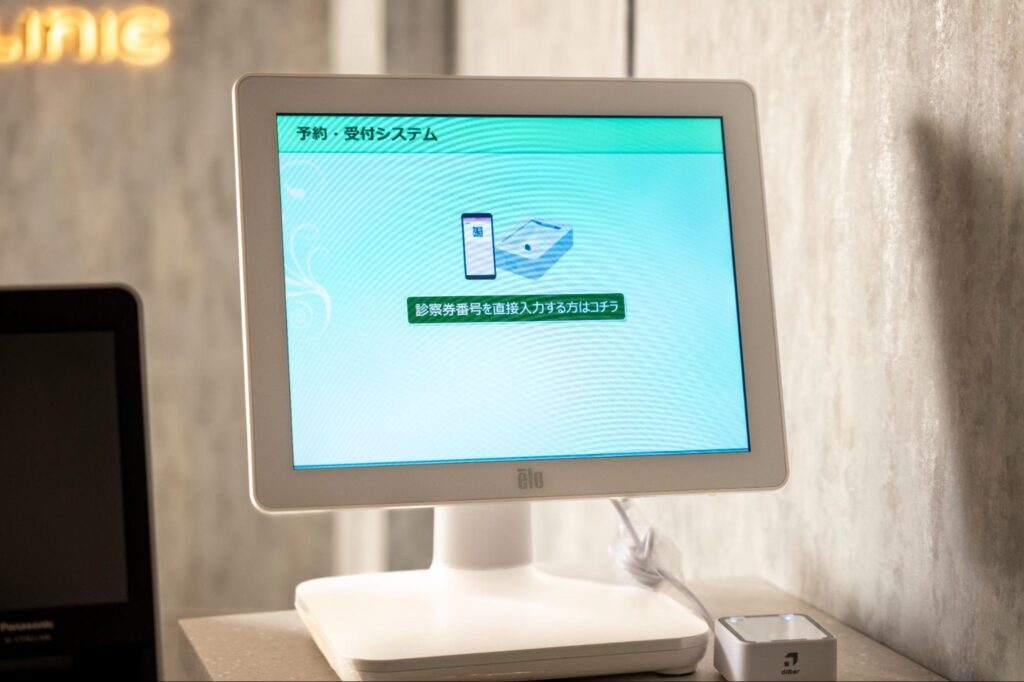Detailed Ultrasound Examination and Screening
About Ultrasound Examination and Screening
Our clinic performs a more detailed Fetal Ultrasound Examination (Fetal Screening Ultrasound Examination) than the routine fetal ultrasound conducted during prenatal check-ups. The purpose of performing a Fetal Screening Ultrasound Examination is to “obtain accurate information about the baby to review appropriate care and delivery methods during pregnancy, and to manage the mother and baby so that both can spend their time safely.”
Difference from Regular Ultrasound Examination in Prenatal Check-ups
While a routine ultrasound assesses the baby’s growth and amniotic fluid volume, the Fetal Detailed Ultrasound Examination is explicitly performed to detect fetal abnormalities. Abnormalities detected by this test include facial anomalies such as cleft lip and palate, as well as internal organ anomalies involving the brain, nerves, heart, and intestines. Even if an abnormality is found, some are minor and do not require treatment after delivery.
Timing and Frequency of Examination
We check for fetal morphological abnormalities during two detailed examinations: around 20 and 30 weeks of pregnancy.
If an Abnormality is Found
Should a morphological abnormality requiring management be found in the fetus, if it is determined that delivery and postpartum management at our clinic would be difficult, we will introduce you to a Comprehensive Perinatal Center capable of providing appropriate management. Please be assured.
Regarding the Delivery Reservation Deposit: If the Deposit was paid before the Fetal Detailed Ultrasound Examination, it cannot be refunded, even if the result necessitates a transfer to another hospital. The Delivery Reservation Deposit is collected to secure a delivery slot at our clinic and to cover the use of in-house medical services during pregnancy. We sincerely ask for your understanding.
Our Fees
20,000 yen per session
< What it includes >
- Fetal Detailed Screening Examination (Fetal Screening Ultrasound Examination)
- Explanation of the images captured during the ultrasound examination
- Aftercare consultation regarding the examination results
Physician in Charge
Ultrasound Specialist / Obstetrician-Gynecologist

NIPT (Non-Invasive Prenatal Testing)
About NIPT
NIPT (Non-Invasive Prenatal Testing) is a test that can detect chromosomal abnormalities in the baby. It is performed by collecting the mother’s blood and is not a direct test on the baby. The conditions that this test can assess are limited to Trisomy 21 (Down Syndrome), Trisomy 18 (Edwards Syndrome), and Trisomy 13 (Patau Syndrome).
Important: It is essential to understand that a negative result from this test does not guarantee a normal baby.
This test is non-confirmatory, so that the result may differ from the actual condition. For instance, if a 35-year-old pregnant woman tests positive with this test, 80% are genuinely affected, while 20% are considered normal babies. Therefore, confirmatory tests such as Amniocentesis or Chorionic Villus Sampling are necessary to establish a definite diagnosis. Conversely, if the result is negative, there is a 99.99% probability of a normal baby; however, there is a 1/1,000 risk of an abnormal baby, which is considered the same as the probability of a general woman conceiving a fetus with Trisomy 21 (Down Syndrome).
Since this is a non-confirmatory test, the Ministry of Health, Labour and Welfare’s “View on Maternal Serum Marker Testing” (1999) states that “physicians do not need to inform pregnant women about this test actively, nor should they recommend it.” Therefore, in Japan, this test is intended to be conducted within a system that provides sufficient Genetic Counseling for prenatal diagnosis.
The Japan Society of Obstetrics and Gynecology and the Japan Medical Association recommend that prenatal genetic testing and diagnosis be conducted under a system that provides proper “Genetic Counseling” by a certified clinical geneticist or equivalent specialist. At our clinic, we ask patients who wish to undergo NIPT to receive genetic counseling.

About Genetic Counseling
Genetic counseling is provided to educate the patient about prenatal diagnosis and to offer support. As a result of counseling, some patients may choose the option of “not undergoing prenatal diagnosis.” In such cases, the testing fee can be refunded.
If you decide not to undergo NIPT and opt for genetic counseling only, the cost is 5,500 yen per session.
Flow of Examination
Genetic Counseling → Examination (Blood Collection) → Results Explanation
Patients who do not wish to receive genetic counseling are welcome to consult with us.
Timing of Examination
From 10 weeks of pregnancy onward.
If an Abnormality is Found
If you desire Amniocentesis based on the NIPT (Non-Invasive Prenatal Testing) result, the additional testing cost for Amniocentesis will be free of charge.
Should a morphological abnormality requiring management be found in the fetus, if it is determined that delivery and postpartum management at our clinic would be difficult, we will introduce you to a Comprehensive Perinatal Center capable of providing appropriate management. Please be assured.
Regarding the Delivery Reservation Deposit: If the Deposit was paid before NIPT (Non-Invasive Prenatal Testing), it cannot be refunded even if the result necessitates a transfer to another hospital. The Delivery Reservation Deposit is collected to secure a delivery slot at our clinic and to cover the use of in-house medical services during pregnancy. We sincerely ask for your understanding.
Our Fees
200,000 yen
< What it includes >
- Genetic Counseling
- NIPT (Non-Invasive Prenatal Testing)
- Amniocentesis in case of a positive NIPT result
- Aftercare consultation regarding the examination results
Physician in Charge
Obstetrician-Gynecologist / Certified Clinical Geneticist
Quad Test (Maternal Serum Marker Test)
About Quad Tests
A Quad Test (Maternal Serum Marker Test), or quadruple screen, can assess the baby’s chromosomal abnormalities and other conditions. It is performed by collecting the mother’s blood and is not a direct test on the baby. The conditions that this test can assess are limited to Trisomy 21 (Down Syndrome), Trisomy 18 (Edwards Syndrome), and Neural Tube Defects.
The risk of the above conditions is calculated as a probability by measuring four blood substances (four serum markers: hCG, AFP, inhibinA, uE3) along with maternal factors (age, weight, race, presence of diabetes, number of previous births, etc.).
Similar to NIPT (Non-Invasive Prenatal Testing), this is a non-confirmatory test, so that the result may differ from the actual condition. The negative predictive value (the probability that the baby is actually normal when the test result is negative) for this test is very high, at 99.965%. Since this figure is comparable to NIPT (Non-Invasive Prenatal Testing), the Quad Test offers a cost advantage if the test result is negative. However, according to Labcorp Japan, which provides the Quad Test, the detection rate for babies with Trisomy 21 (Down Syndrome) using the Quad Test (Maternal Serum Marker Test) is 87%, meaning 13% of cases are missed. In other words, the Quad Test (Maternal Serum Marker Test) has a high negative predictive value but a low detection rate, which is worth noting. Therefore, confirmatory testing, such as Amniocentesis or Chorionic Villus Sampling, is necessary to establish a definite diagnosis.
(For reference: lacorp website – Please use your web browser’s translation function)
Flow of Examination
Consultation/Explanation → Examination (Blood Collection) → Results Explanation
Timing of Examination
From 15 weeks of pregnancy onward.
If an Abnormality is Found
If you desire Amniocentesis based on the Quad Test (Maternal Serum Marker Test) results, additional testing fees for the Amniocentesis will apply.
Should a morphological abnormality requiring management be found in the fetus, if it is determined that delivery and postpartum management at our clinic would be difficult, we will refer you to a Comprehensive Perinatal Center capable of providing appropriate management. Please be assured.
Regarding the Delivery Reservation Deposit: If the Deposit was paid before the Quad Test (Maternal Serum Marker Test), it cannot be refunded even if the result necessitates a transfer to another hospital. The Delivery Reservation Deposit is collected to secure a delivery slot at our clinic and to cover the use of in-house medical services during pregnancy. We sincerely ask for your understanding.
Our Fees
40,000 yen
Physician in Charge
Obstetrician-Gynecologist
Amniocentesis
About Amniocentesis
Amniocentesis is an examination performed as a definitive diagnosis for fetal genetic disorders. While prioritizing safety with the use of ultrasound, a needle is inserted into the amniotic cavity (the space where amniotic fluid is collected) inside the uterus to collect 10 to 20 ml of amniotic fluid. The fetal cells in amniotic fluid are cultured and analyzed for fetal chromosomes. When collecting the amniotic fluid, the needle penetrates the amniotic membrane (the membrane surrounding the amniotic fluid), and the reported risk of premature rupture of membranes due to puncture is 1%, and the risk of miscarriage is 0.13% to 0.27%. No patients at our clinic have experienced premature rupture of membranes or miscarriage due to amniocentesis.
There are several methods of chromosome analysis. For amniocentesis, G-banding is most commonly used, and you can also choose options such as FISH and Microarray Test. The level of detail in the analysis increases sequentially from the G-banding method to the FISH method to the Microarray method. The G-banding method takes 2 to 3 weeks for results after the test, while the FISH method provides results in about 1 week, making it a rapid option. If Trisomy 21 (Down Syndrome), Trisomy 18 (Edwards Syndrome), and Trisomy 13 (Patau Syndrome) are ruled out by the FISH test result, the result is not reversed when the G-banding and Microarray Test results are obtained.
It is reported that approximately 6% of fetuses diagnosed with a normal karyotype by conventional chromosome testing methods, such as G-banding, have a clinically significant chromosomal abnormality detected by the Microarray Test when morphological abnormalities are observed in the Fetal Detailed Ultrasound Examination (Fetal Screening Ultrasound). Therefore, the Microarray Test is considered when fetal morphological abnormalities are observed in the Fetal Detailed Ultrasound Examination (Fetal Screening Ultrasound). Conversely, suppose a specific condition is suspected based on the Fetal Detailed Ultrasound Examination (Fetal Screening Ultrasound) (e.g., polyhydramnios suggesting Trisomy 18, Fetal Growth Restriction, overlapping fingers). In that case, conventional chromosome testing methods, such as G-banding, are considered before the Microarray Test.
For the Microarray Test, blood samples from both parents are required.
Flow of Examination
Consultation/Explanation → Examination (Amniotic Fluid Collection) → Results Explanation
Hospitalization is not required for the examination.
Timing of Examination
From 15 weeks of pregnancy onward.
If an Abnormality is Found
Should a morphological abnormality requiring management be found in the fetus, if it is determined that delivery and postpartum management at our clinic would be difficult, we will refer you to a Comprehensive Perinatal Center capable of providing appropriate management. You can also consult us if you desire other treatments.
Regarding the Delivery Reservation Deposit: If the Deposit was paid before Amniocentesis, it cannot be refunded even if the result necessitates a transfer to another hospital. The Delivery Reservation Deposit is collected to secure a delivery slot at our clinic and to cover the use of in-house medical services during pregnancy. We sincerely ask for your understanding.
Our Fees
200,000 yen ~
The fee varies depending on the analysis method.
Physician in Charge
Obstetrician-Gynecologist
Frequently Asked Questions (FAQ)
| Q | How does the Fetal Detailed Ultrasound Examination differ from the regular ultrasound during prenatal check-ups? |
| A | The regular ultrasound during prenatal check-ups primarily confirms the baby’s growth status and the amount of amniotic fluid. The Fetal Detailed Ultrasound Examination (Fetal Screening Ultrasound Examination), on the other hand, is a detailed examination to detect congenital abnormalities (brain, heart, internal organs, face, etc.) in the baby. |
| Q | Is the Fetal Detailed Ultrasound Examination mandatory for everyone? |
| A | We encourage all expectant mothers to undergo the Fetal Detailed Ultrasound Examination to gain a more comprehensive understanding of their baby’s health status. This information is vital for ensuring a safe and peaceful delivery. |
| Q | What is the difference between NIPT (Non-Invasive Prenatal Testing) and the Quad Test? |
| A | Both tests use the mother’s blood, but NIPT has higher accuracy and is specialized for Trisomy 21, 18, and 13. The Quad Test has a slightly lower detection rate but can also evaluate the risk of Neural Tube Defects, and offers a cost advantage. |
| Q | What should I do if an abnormality is found during testing? |
| A | Depending on the test’s content and results, we will guide you through the process, including referrals to necessary medical institutions and recommendations for additional testing (such as Amniocentesis). Please be assured that we will provide thorough support to alleviate your concerns as much as possible. |
| Q | Does insurance cover the examination fees? |
| A | Most examinations related to prenatal diagnosis are considered self-pay medical services and are not covered by health insurance. |
Booking an Appointment
Outpatient consultations at our clinic are by appointment. For smoother guidance, please make a reservation in advance using the online reservation form. Even without a reservation, you may receive a consultation on the day. Please feel free to inquire.
TEL:03-6450-3850
